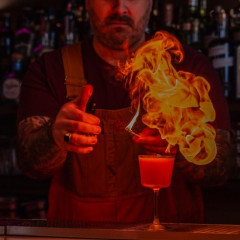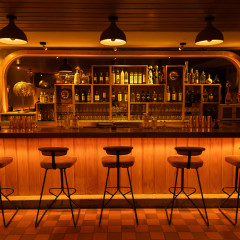 Rich social types have started making money instead of just spending it. A new W Magazine article discusses the recent batch of socialite types who've decided that a DJ career is the latest must-have accessory. Spinners who've actually studied their craft aren't thrilled. We've written about real deal DJs and where to hear them before. But we also don't think that conflict between the dilettantes and the dedicated is necessary. -
Rich social types have started making money instead of just spending it. A new W Magazine article discusses the recent batch of socialite types who've decided that a DJ career is the latest must-have accessory. Spinners who've actually studied their craft aren't thrilled. We've written about real deal DJs and where to hear them before. But we also don't think that conflict between the dilettantes and the dedicated is necessary. -
 It's tough to fault these people for cashing in on their looks or famous last names. The money is great--Samantha Ronson reportedly got $25,000 per gig back back when she brought Lindsay Lohan along to stumble on the dancefloor--and who among us hasn't wanted to commandeer a party soundtrack with our own iPod? And to their credit, most members of the gang realize they're not really DJs at all.
It's tough to fault these people for cashing in on their looks or famous last names. The money is great--Samantha Ronson reportedly got $25,000 per gig back back when she brought Lindsay Lohan along to stumble on the dancefloor--and who among us hasn't wanted to commandeer a party soundtrack with our own iPod? And to their credit, most members of the gang realize they're not really DJs at all.
“I do feel guilty when I get paid a lot of money, showing up with two iPods," admits Matt Creed.
 I for one don't think much competition between fake and real DJs is there to begin with. The places that hire Alexandra Richards and her demi-celebrity peers to "spin"--Avenue, Butter, Southside, GoldBar--don't claim to be about the music. They're about pretty crowds sipping pretty drinks in pretty clothing. Trained DJs playing interesting, progressive music are uninterested in these people, and vice versa. Really, these two breeds of DJs should and do run in different circles.
I for one don't think much competition between fake and real DJs is there to begin with. The places that hire Alexandra Richards and her demi-celebrity peers to "spin"--Avenue, Butter, Southside, GoldBar--don't claim to be about the music. They're about pretty crowds sipping pretty drinks in pretty clothing. Trained DJs playing interesting, progressive music are uninterested in these people, and vice versa. Really, these two breeds of DJs should and do run in different circles.
If anything, celebrity DJs are a product rather than a cause of a  diluted club culture. These days, going out is an aspirational undertaking for a sad number of people. Having fun takes a backseat to posing for a great picture or rubbing shoulders with celebrities, no matter how minor. Noted lightweight DJ Paul Sevigny says that when scenesters push Shuffle on their iPods, “There’s not some guy 15 yards above the crowd, sending down music like the hand of God.” But New York's upscale clubgoers now worship at the altar of a different higher power, and we're not sure it's an improvement.
diluted club culture. These days, going out is an aspirational undertaking for a sad number of people. Having fun takes a backseat to posing for a great picture or rubbing shoulders with celebrities, no matter how minor. Noted lightweight DJ Paul Sevigny says that when scenesters push Shuffle on their iPods, “There’s not some guy 15 yards above the crowd, sending down music like the hand of God.” But New York's upscale clubgoers now worship at the altar of a different higher power, and we're not sure it's an improvement.
Main photo courtesy of www.wmagazine.com


.jpg)
.jpg)



.jpg)
.jpg)
.jpg)



(6).jpg)
